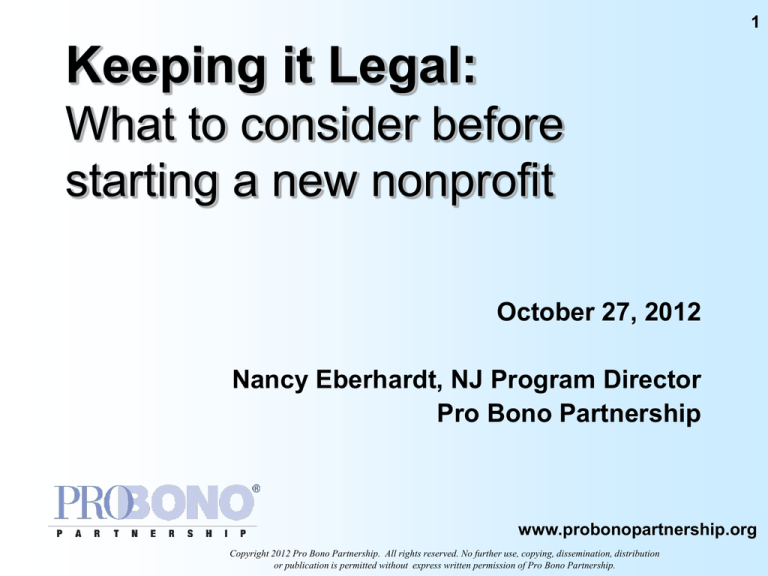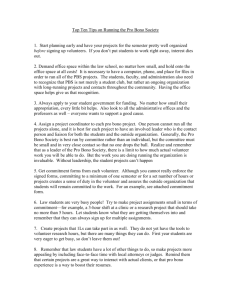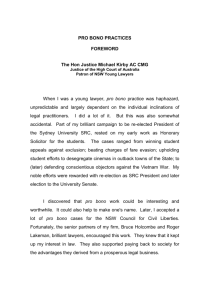
1
Keeping it Legal:
What to consider before
starting a new nonprofit
October 27, 2012
Nancy Eberhardt, NJ Program Director
Pro Bono Partnership
www.probonopartnership.org
Copyright 2012 Pro Bono Partnership. All rights reserved. No further use, copying, dissemination, distribution
or publication is permitted without express written permission of Pro Bono Partnership.
2
What is the Pro Bono Partnership?
Free business and transactional legal services for nonprofit
organizations through the services of our staff and corporate and
private attorney volunteers
To be eligible, the organization must be:
– Nonprofit, tax exempt (or seeking 501(c)(3) status);
– Primarily serving the disadvantaged and enhancing the quality of life
in their neighborhoods;
– Focusing on health and human services, community development,
affordable housing, neighborhood revitalization, environmental
protection, or the arts;
– Providing programs that have a demonstrable impact; and
– Unable to pay for legal services without significant impairment of
program resources.
www.probonopartnership.org
Copyright 2012 Pro Bono Partnership. All rights reserved. No further use, copying, dissemination, distribution
or publication is permitted without express written permission of Pro Bono Partnership.
3
Introduction
The nonprofit sector is growing quickly
But revenue sources are decreasing, especially
in this economy!
More targeted individual giving and
redirected/focused corporate giving
Resulting in an environment where it is
essential to make a disciplined assessment
of whether it makes sense for you to
incorporate and apply for tax exemption
The Partnership’s experience screening new
organizations
www.probonopartnership.org
Copyright 2012 Pro Bono Partnership. All rights reserved. No further use, copying, dissemination, distribution
or publication is permitted without express written permission of Pro Bono Partnership.
4
Myth or Reality?
Nonprofit and tax exempt mean the same thing (or nonprofit
corporations are automatically tax exempt)
An organization cannot raise money unless it is tax exempt
Every good idea deserves a nonprofit
If I am the founder, I can pretty much run the nonprofit the
way I want
Nonprofits can’t make a profit
Being on the Board of a nonprofit is not “serious”, the way
being on the Board of a for-profit company is
Nonprofits cannot engage in lobbying
www.probonopartnership.org
Copyright 2012 Pro Bono Partnership. All rights reserved. No further use, copying, dissemination, distribution
or publication is permitted without express written permission of Pro Bono Partnership.
5
Myth or Reality?
(cont’d)
Nonprofits cannot pay salaries (or nonprofits can pay any
salaries they want to)
Nonprofits are exempt from workers’ compensation and
unemployment laws
I can get a tax deduction for the time/services I give to my
nonprofit
I can get a tax deduction for use of my space
State tax and local property tax exemptions are automatic
for a 501(c)(3) organization
www.probonopartnership.org
Copyright 2012 Pro Bono Partnership. All rights reserved. No further use, copying, dissemination, distribution
or publication is permitted without express written permission of Pro Bono Partnership.
Incorporation and Tax Exemption
6
Becoming a tax-exempt organization is a twostep process
•
First step: Incorporation is a product of state law;
obtained by filing a certificate of incorporation or
articles of incorporation with the state
•
Second step: Tax exemption is a federal
designation for which the corporation applies to the
Internal Revenue Service on Form 1023 and asks to
be recognized as tax exempt
www.probonopartnership.org
Copyright 2012 Pro Bono Partnership. All rights reserved. No further use, copying, dissemination, distribution
or publication is permitted without express written permission of Pro Bono Partnership.
7
Pros and Cons of Incorporating
PROS
CONS
Limited liability
State filings
Facilitates tax exemption
Federal filings
More attractive to
funders
Maintaining corporate
records
Perpetual existence
Observing corporate
formalities
Must recruit and retain
people to carry out
responsibilities
Perpetual existence
www.probonopartnership.org
Copyright 2012 Pro Bono Partnership. All rights reserved. No further use, copying, dissemination, distribution
or publication is permitted without express written permission of Pro Bono Partnership.
8
Organizational Requirements
Not-for-profit vs. for profit
Bylaws
Membership vs. nonmembership
Board of Directors/Board of Trustees
Officers
Staff
www.probonopartnership.org
Copyright 2012 Pro Bono Partnership. All rights reserved. No further use, copying, dissemination, distribution
or publication is permitted without express written permission of Pro Bono Partnership.
9
Organization Chart for Nonprofits
Members
(if applicable)
Elect
Directors/Trustees
Hire & Supervise
Executive Director
Hires & Supervises
Remaining
Staff
(Paid and Unpaid)
www.probonopartnership.org
Copyright 2012 Pro Bono Partnership. All rights reserved. No further use, copying, dissemination, distribution
or publication is permitted without express written permission of Pro Bono Partnership.
10
Incorporating Generally
Each state has its own Nonprofit Corporations Act or
Nonstock Corporation Act (or some other name)
You generally must complete and file a Certificate of
Incorporation (sometimes called Articles of
Incorporation) with a state agency; agency that handles
incorporations and fees vary between states.
Usually, must decide:
• Membership or non-membership
• Agent for service of process
• Carefully state your organization’s mission, keeping in mind
your intention to apply for federal tax-exempt status
• Incorporators sign
www.probonopartnership.org
Copyright 2012 Pro Bono Partnership. All rights reserved. No further use, copying, dissemination, distribution
or publication is permitted without express written permission of Pro Bono Partnership.
11
Incorporating Generally (cont’d)
Other State filing requirements:
•
•
Usually some kind of consumer protection function
within each state.
Some states have specific filing requirements
depending on type of activities (example: NY
nonprofits engaging in educational activities)
www.probonopartnership.org
Copyright 2012 Pro Bono Partnership. All rights reserved. No further use, copying, dissemination, distribution
or publication is permitted without express written permission of Pro Bono Partnership.
12
501(c)(3) Tax Exemption
501(c)(3) is one type of tax-exempt organization
Can accept tax-deductible charitable donations
Doesn’t pay income taxes; may be exempt from
sales, property, and other state and local taxes
No private benefit or inurement
Registration and reporting requirements
Restrictions on lobbying activities
Absolute bar on political campaign activities
www.probonopartnership.org
Copyright 2012 Pro Bono Partnership. All rights reserved. No further use, copying, dissemination, distribution
or publication is permitted without express written permission of Pro Bono Partnership.
13
501(c)(3) Tax Exemption
(cont’d)
Transparency and accountability
Organizations that don’t have to apply to have
tax exemption
• Religious organizations that are houses of worship
(not just faith-based charities)
• Organizations under a “group exemption”
• Organizations with annual gross receipts of not
more than $5,000
www.probonopartnership.org
Copyright 2012 Pro Bono Partnership. All rights reserved. No further use, copying, dissemination, distribution
or publication is permitted without express written permission of Pro Bono Partnership.
14
How to Apply for 501(c)(3) Tax Exemption
Obtain a federal tax ID number, EIN, from the IRS
(Form SS-4)
Complete and file IRS Form 1023
• Set out, in detail, information about the organization,
including its mission, programs, structure, fundraising
program, sources of financial support, and three-year budget
• $850 filing fee; $400 if annual gross receipts of $10,000 or
less
• IRS is working on “Cyber Assistant” that may result in
reduced fees
• File within 27 months of incorporating to get tax exemption
retroactive to the date of incorporation; if more than 27
months, retroactive to date that Form 1023 is filed
www.probonopartnership.org
Copyright 2012 Pro Bono Partnership. All rights reserved. No further use, copying, dissemination, distribution
or publication is permitted without express written permission of Pro Bono Partnership.
15
External Oversight of Tax-Exempt
Organizations
IRS
• Compliance and reporting requirements
• The IRS recently revoked tax-exempt status for over 385,000
organizations for failure to a Form 990 for three consecutive
years [IRS Data Book 2011]
State Attorneys General
www.probonopartnership.org
Copyright 2012 Pro Bono Partnership. All rights reserved. No further use, copying, dissemination, distribution
or publication is permitted without express written permission of Pro Bono Partnership.
16
External Oversight of Tax-Exempt
Organizations
Other State agencies (e.g., Departments of State and
Taxation)
Public
Media
Grantmakers
Sarbanes-Oxley legislation
www.probonopartnership.org
Copyright 2012 Pro Bono Partnership. All rights reserved. No further use, copying, dissemination, distribution
or publication is permitted without express written permission of Pro Bono Partnership.
17
Is Incorporation/Tax Exemption Right
for You? Ask These Questions:
1.
Do your purposes fit within 501(c)(3)?
2.
Is your mission clearly articulated?
3.
Is there a profit motive?
4.
Is there a need for your services?
5.
Are other organizations doing what you want to do?
Locally? If so, how will your activities differ?
6.
Whom do you plan to benefit? Many, or just a few?
7.
Who is involved with the organization?
(continued…)
www.probonopartnership.org
Copyright 2012 Pro Bono Partnership. All rights reserved. No further use, copying, dissemination, distribution
or publication is permitted without express written permission of Pro Bono Partnership.
18
Ask These Questions
(cont’d):
8.
Where will you get your $$? Do you have identified sources
of funding?
9.
Do you have only a short-term project?
10.
Do you have a need for privacy?
11.
Do you plan to do more than an insubstantial amount of
lobbying, or engage in any political campaign activities?
12.
Do you have the personality needed to work under the
direction of a board and timely file required reports with
government agencies?
13.
Do you have any experience working with/for a nonprofit
organization?
14.
Can you afford it?
15.
Have you considered alternatives to incorporation and tax
exemption?
www.probonopartnership.org
Copyright 2012 Pro Bono Partnership. All rights reserved. No further use, copying, dissemination, distribution
or publication is permitted without express written permission of Pro Bono Partnership.
19
1. Do your purposes fit within 501(c)(3)?
IRC Section 501(c)(3)
• The organization must be “organized and operated
exclusively for religious, charitable, scientific, testing for
public safety, literary, or educational purposes, or to foster
national or international amateur sports competition…, or
for the prevention of cruelty to children or animals”
“Charitable” covers a wide variety of objectives,
including:
• Relief of the poor and distressed or of the underprivileged
• Lessening the burdens of government
• Lessening neighborhood tensions
• Combating community deterioration
www.probonopartnership.org
Copyright 2012 Pro Bono Partnership. All rights reserved. No further use, copying, dissemination, distribution
or publication is permitted without express written permission of Pro Bono Partnership.
20
1. Do your purposes fit within 501(c)(3)?
(cont’d)
Other purposes may not qualify under 501(c)(3), but the
organization may still qualify as tax exempt under
another subsection of Section 501. However, donations
to these groups are likely not deductible as charitable
contributions. For example:
• 501(c)(4) – civic leagues and social welfare organizations
(e.g., a block association)
• 501(c)(6) – business leagues (e.g., Chamber of
Commerce)
• 501(c)(7) – social clubs
www.probonopartnership.org
Copyright 2012 Pro Bono Partnership. All rights reserved. No further use, copying, dissemination, distribution
or publication is permitted without express written permission of Pro Bono Partnership.
21
2. Is your mission clearly articulated?
• Important as a basis for exemption, continuing focus,
organizational documents, public relations, and
accessing funding
3. Is there a profit motive?
• 501(c)(3) status requires that “no part of the net
earnings…inures to the benefit of any private
shareholder or individual”
•
This is the “nondistribution constraint”
• Compensation must be “reasonable” – sanctions if
violated
• Upon dissolution, all assets must be distributed to other
501(c)(3) organizations or to the government for public
purposes
www.probonopartnership.org
Copyright 2012 Pro Bono Partnership. All rights reserved. No further use, copying, dissemination, distribution
or publication is permitted without express written permission of Pro Bono Partnership.
22
4. Is there a need for your services?
• Have you done a needs assessment?
• Could you operate as a program of an existing
organization?
5. Are other organizations doing what you
want to do? Locally? If so, how will your
activities differ?
• Will you be duplicating already available services?
• Is there limited funding for such services?
www.probonopartnership.org
Copyright 2012 Pro Bono Partnership. All rights reserved. No further use, copying, dissemination, distribution
or publication is permitted without express written permission of Pro Bono Partnership.
23
6. Whom do you plan to benefit? Many, or just
a few?
• Can’t establish a 501(c)(3) to benefit just one person or
a few people
7. Who is involved with the organization?
•
•
•
•
•
•
How many board members do you have?
What is their ongoing commitment to the organization?
Are they all family and/or friends?
Do they represent the public?
What skill(s) does each person bring to the organization?
Is someone good at/fond of administrative/organizational
tasks?
• Are there others who will help in non-board member
roles?
www.probonopartnership.org
Copyright 2012 Pro Bono Partnership. All rights reserved. No further use, copying, dissemination, distribution
or publication is permitted without express written permission of Pro Bono Partnership.
24
8. Where will you get your $$? Do you have
identified sources of funding?
• Fees? Donations? Government? Corporations?
• Must be able to articulate this on Form 1023
• Some funders are reluctant to fund start-ups
• Do your volunteers have the skills to fundraise?
• Is the organization sustainable?
9. Do you have only a short-term project?
• If so, might be better to use a fiscal sponsor or work as
a program of an existing agency
www.probonopartnership.org
Copyright 2012 Pro Bono Partnership. All rights reserved. No further use, copying, dissemination, distribution
or publication is permitted without express written permission of Pro Bono Partnership.
25
10. Do you have a need for privacy?
• 501(c)(3) “public charities” are accountable to the
public and full disclosure is mandated in some
circumstances
• Form 990 annual informational tax returns – must
disclose information such as compensation of key
employees and corporate governance policies;
must make copies of Form 990 available on
demand; also likely posted online
•
The list of donors filed with the annual Form 990
does not have to be disclosed by a 501(c)(3)
public charity
• Annual reports filed with state authorities
www.probonopartnership.org
Copyright 2012 Pro Bono Partnership. All rights reserved. No further use, copying, dissemination, distribution
or publication is permitted without express written permission of Pro Bono Partnership.
26
11. Do you plan to do more than an
insubstantial amount of lobbying, or
engage in any political campaign activities?
• A 501(c)(3) cannot have a “substantial part” of its
activities consisting of attempts to influence legislation
•
Section 501(h) Election on IRS Form 5768
• A 501(c)(3) is prohibited from participating in
campaign-related activities – supporting or opposing a
candidate for public office
12. Do you have the personality needed to work
under the direction of a board and timely
file required reports with government
agencies?
• If no, starting a nonprofit may not be right for you
www.probonopartnership.org
Copyright 2012 Pro Bono Partnership. All rights reserved. No further use, copying, dissemination, distribution
or publication is permitted without express written permission of Pro Bono Partnership.
27
13. Do you have any experience working
with/for a nonprofit organization?
• Funders will look at your experience
• Experienced board or staff available?
14. Can you afford it?
• Filing fees?
• Insurance?
• Startup costs?
• Overhead/administrative costs (e.g., wages)?
• Annual accounting fees?
www.probonopartnership.org
Copyright 2012 Pro Bono Partnership. All rights reserved. No further use, copying, dissemination, distribution
or publication is permitted without express written permission of Pro Bono Partnership.
28
15. Have you considered alternatives to
incorporation and tax exemption?
(A) Become a program of another organization
Pros:
•
Able to concentrate on and build your program
•
Do not need to deal with fundraising, administrative,
or organizational issues
Cons:
•
Lack of control
•
Lack of identity
www.probonopartnership.org
Copyright 2012 Pro Bono Partnership. All rights reserved. No further use, copying, dissemination, distribution
or publication is permitted without express written permission of Pro Bono Partnership.
29
15. Have you considered alternatives to
incorporation and tax exemption? (cont’d)
(B) Fiscal Sponsorship
•
An existing 501(c)(3) organization (the “Sponsor”)
may financially support an unrelated organization (the
“Project”) as long as doing so furthers the Sponsor’s
exempt purposes
•
Funders donate to the Sponsor, which reports the
income, controls the administration of funds and the
Project’s activities, and is responsible for
recordkeeping and reporting to IRS and state
agencies on behalf of the Project
•
Sponsor may charge a reasonable fee for its
administrative services
www.probonopartnership.org
Copyright 2012 Pro Bono Partnership. All rights reserved. No further use, copying, dissemination, distribution
or publication is permitted without express written permission of Pro Bono Partnership.
30
15. Have you considered alternatives to
incorporation and tax exemption? (cont’d)
(B) Fiscal Sponsorship (cont’d)
•
Good idea for new groups; allows them to focus on
developing their programs
•
Often temporary/short-term arrangements – can be an
interim step on the road to incorporation and tax
exemption
•
Many different ways to structure a fiscal sponsorship.
A written agreement is recommended and can be
tailored to the needs of each Sponsor and Project
www.probonopartnership.org
Copyright 2012 Pro Bono Partnership. All rights reserved. No further use, copying, dissemination, distribution
or publication is permitted without express written permission of Pro Bono Partnership.
31
15. Have you considered alternatives to
incorporation and tax exemption? (cont’d)
(B) Fiscal Sponsorship
(cont’d)
•
Choose the fiscal sponsor carefully – investigate it to make
sure it is well run.
•
For questions to ask, see the National Network of Fiscal
Sponsors’ Guidelines for Comprehensive Fiscal
Sponsorship, at www.tides.org/fileadmin/user/NNFS/NNFSFiscal-Sponsorship-Guidelines-for-Comprehensive.pdf
www.probonopartnership.org
Copyright 2012 Pro Bono Partnership. All rights reserved. No further use, copying, dissemination, distribution
or publication is permitted without express written permission of Pro Bono Partnership.
32
Ingredients for Success
Clear Mission
“Market” Niche – need for organization
Business and Budget Planning
Adequate Sources of Funding
Strong Administrative Skills
Committed Board Members
Committed Volunteers
Appropriate Staff
www.probonopartnership.org
Copyright 2012 Pro Bono Partnership. All rights reserved. No further use, copying, dissemination, distribution
or publication is permitted without express written permission of Pro Bono Partnership.
33
Resources
IRS website offers online training on a wide range of subjects
relevant to maintaining tax-exempt status: www.stayexempt.org
IRS Publication 557 explains the process of applying for taxexempt status: www.irs.gov/pub/irs-pdf/p557.pdf
Center for Nonprofit Management booklet “Get Ready, Get Set!
What You Need To Know Before Starting a Nonprofit”:
www.cnmsocal.org/images/downloads/startinganonprofit_get
readygetset.pdf
Center for Non-Profits booklet “Thinking of Forming a Non-Profit?
What to Consider Before You Begin”:
www.njnonprofits.org/ThinkingOfFormingDesc.html
BoardSource booklet “Starting a Nonprofit Organization”:
www.boardsource.org/dl.asp?document_id=17
www.probonopartnership.org
Copyright 2012 Pro Bono Partnership. All rights reserved. No further use, copying, dissemination, distribution
or publication is permitted without express written permission of Pro Bono Partnership.
34
Resources
(cont’d)
American Bar Association “Tool Kit” that outlines the process of
completing the IRS Application for Tax Exemption:
www.npaction.org/resources/tetk.pdf
Foundation Center’s tutorial on starting a nonprofit:
http://foundationcenter.org/getstarted/tutorials/establish
Information on other charities:
• GuideStar: www2.guidestar.org
• Charity Navigator: www.charitynavigator.org
The Pro Bono Partnership website contains many publications:
www.probonopartnership.org/Pages/Publications/allpublicationsfaqs-x
www.probonopartnership.org
Copyright 2012 Pro Bono Partnership. All rights reserved. No further use, copying, dissemination, distribution
or publication is permitted without express written permission of Pro Bono Partnership.
35
Resources
(cont’d)
Resources for Developing a Business Plan:
• SCORE: www.score.org/business_toolbox.html and
www.score.org/resources/search/all/283%2C263
• U.S. Chamber of Commerce Small Business Nation:
www.uschambersmallbusinessnation.com/toolkits/startup
• U.S. Small Business Administration:
www.sba.gov/category/navigation-structure/startingmanaging-business/starting-business
• Many states have pro bono services for start-ups – check the
state and local bar associations, local law schools, and your
state’s Nonprofit Association.
www.probonopartnership.org
Copyright 2012 Pro Bono Partnership. All rights reserved. No further use, copying, dissemination, distribution
or publication is permitted without express written permission of Pro Bono Partnership.
36
Please Note
IRS Circular 230 Disclosure: To ensure compliance with
requirements imposed by the IRS, we inform you that
any tax advice contained in this communication
(including any attachments) is not intended or written to
be used, and cannot be used, for the purpose of (i)
avoiding penalties under the Internal Revenue Code or
(ii) promoting, marketing, or recommending to another
party any transaction or matter addressed herein.
This presentation is provided as a general informational
service to clients and friends of the Pro Bono
Partnership. It should not be construed as, and does not
constitute, legal advice on any specific matter, nor does
this presentation create an attorney-client
relationship. You should seek advice based on your
particular circumstances from an independent legal
advisor.
www.probonopartnership.org
Copyright 2012 Pro Bono Partnership. All rights reserved. No further use, copying, dissemination, distribution
or publication is permitted without express written permission of Pro Bono Partnership.







